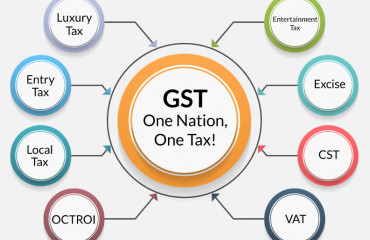
The GST council has withdrawn exemptions from taxation on some food items, grains, etc. With this withdrawal, milk products like pre-packed, pre-labeled curd, lassi, and buttermilk will have a GST rate from the current NIL. This move is expected to push dairy companies in hiking their consumer prices to pass on the impact of additional costs. Although, there is limited impact seen in volumes. Heritage Foods and Dodla Dairy are two hot stocks in the sector.
The GST council has withdrawn exemptions from taxation on some food items, grains, etc. With this withdrawal, milk products like pre-packed, pre-labeled curd, lassi, and buttermilk will have a GST rate from the current NIL. This move is expected to push dairy companies in hiking their consumer prices to pass on the impact of additional costs. Although, there is limited impact seen in volumes. Heritage Foods and Dodla Dairy are two hot stocks in the sector.
In the 47th meet, the GST Council chaired by Finance Minister Nirmala Sitharaman under withdrawal of exemptions, said, "hitherto, GST was exempted on specified food items, grains, etc when not branded, or right on the brand has been foregone. It has been recommended to revise the scope of the exemption to exclude from its prepackaged and pre-labeled retail pack in terms of the Legal Metrology Act, including pre-packed, pre-labeled curd, lassi, and buttermilk.
Research Analysts, Aniruddha Joshi, Manoj Menon, Karan Bhuwania, and Pranjal Garg at ICICI Securities in their research note, said the GST rate on curd and lassi is expected to be levied at 5% from nil currently.
"Considering the rising milk procurement prices as well as new likely levy of 5%, we believe dairy companies need to pass on additional costs to end consumers via price hikes," they added.
They pointed out that curd is a major product for most dairy companies. Curd and lassi account for 15-25% of the revenues of dairy companies under their coverage.
However, the analysts do not expect any material impact on any dairy company.
Currently, both major products of listed dairy companies such as milk and curd are free from any GST rates.
According to the analysts, with the likely levy of 5% GST on curd, dairy companies will be able to achieve input credit (packaging material, some raw materials, ad-spend, transportation & freight costs, etc). They said, "We believe the net impact of GST levy will be in the range of 2-3%."
Explaining there will be limited impact in volume terms, the analysts said, "as most consumers boil milk before consuming it, they might still continue to buy unorganised milk. However, as consumers consume curd directly, they will prefer to continue buying organised curd, in our view. Hence, we see low possibility of losing curd volumes to unorganised players even with higher difference in pricing of organised vs unorganised."
Notably, some dairy products like ice cream, cheese, ghee, and paneer are already under the GST ambit. With a likely levy of GST on curds and lassi, analysts believe most dairy products are under the GST umbrella. However, there is still no GST on packaged milk.
Further, the analysts said, "Considering the strong return ratios and growth potential, we remain positive on the dairy sector. We also expect migration from unorganised to organised sector to steadily generate value. Heritage and Dodla are our top picks."
ICICI Securities have given a buy rating on both Heritage and Dodla. They expect a return on equity at 23.4% by FY23 end on Heritage, while RoE is seen at 21.5% by FY24-end. On Dodla, the analysts estimate RoE of 15% by FY23-end and 15.9% by FY24-end.
On BSE, Heritage shares closed at ₹264.20 apiece marginally down. Dodla finished at ₹479.90 apiece down by 0.9% on Friday.
The analysts have given a Hold recommendation on Hatsun Agro Products and Parag Milk Foods.
For the industry, key risks as per the analysts would be a higher-than-expected rise in milk prices, delay in price hikes, and irrational competitive pressures.
